Interview: Gary Clark Jr, from having his power cut to sharing a stage with Eric Clapton
On the eve of the arrival of his third major-label studio record, ‘This Land’, the Grammy-winning Texan tells us a tale of broken hands, baffling bagpipes and his newfound love for the Gibson SG…
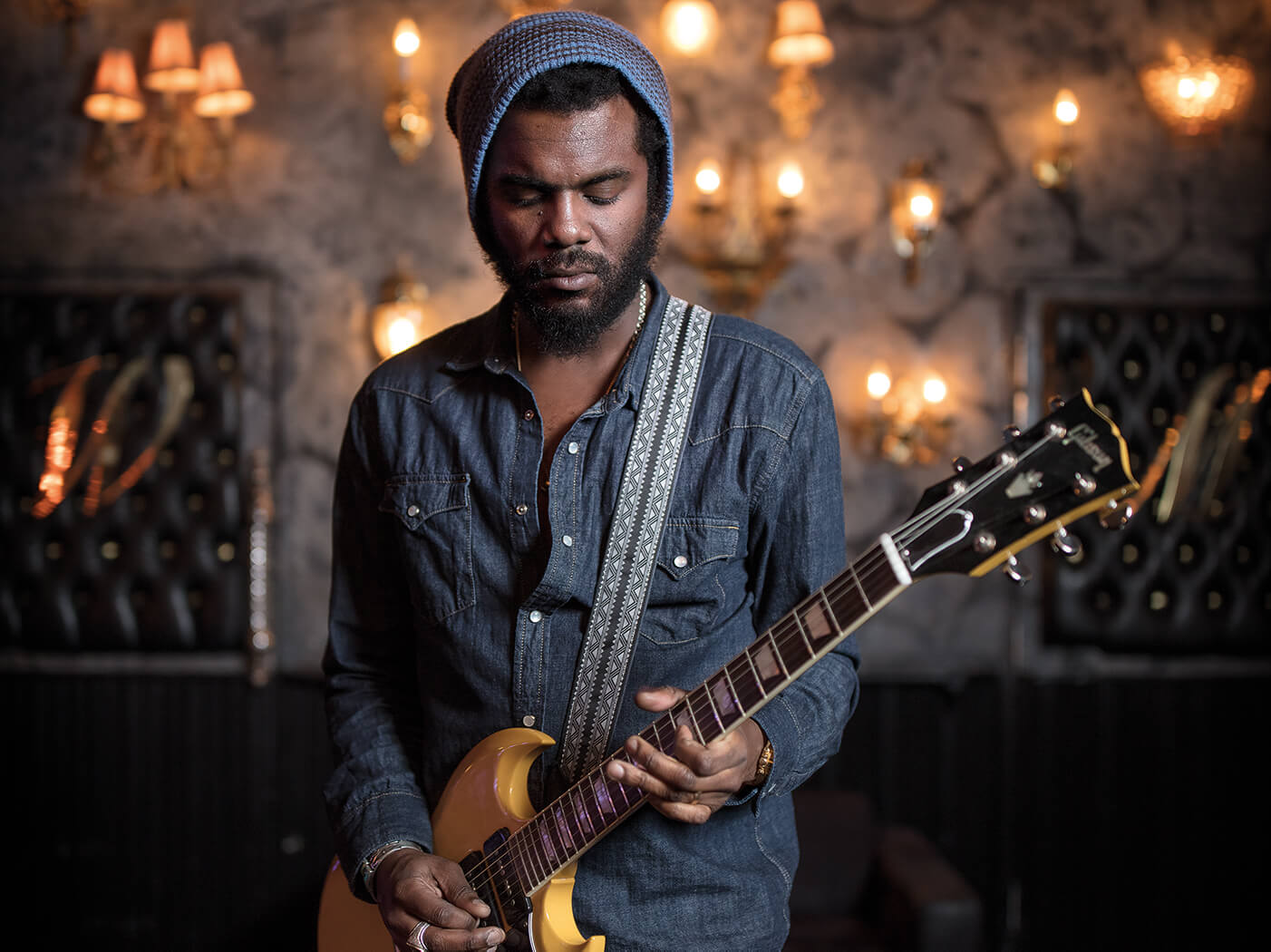
Image: Ryan Hunter
Gary Clark Jr is back in his hometown of Austin, Texas for a sold-out three-night stint
at the Moody Theater, and as we catch up with the guitarist in the afternoon before his opening hometown gig, if he’s feeling the pressure of playing in front of nearly 9,000 of his compatriots, he’s certainly not showing it. “It’s nice to be back in Austin,” the 34-year-old reflects, nonchalantly. “I don’t get back here a lot, so it’s great to hang out, y’know?”
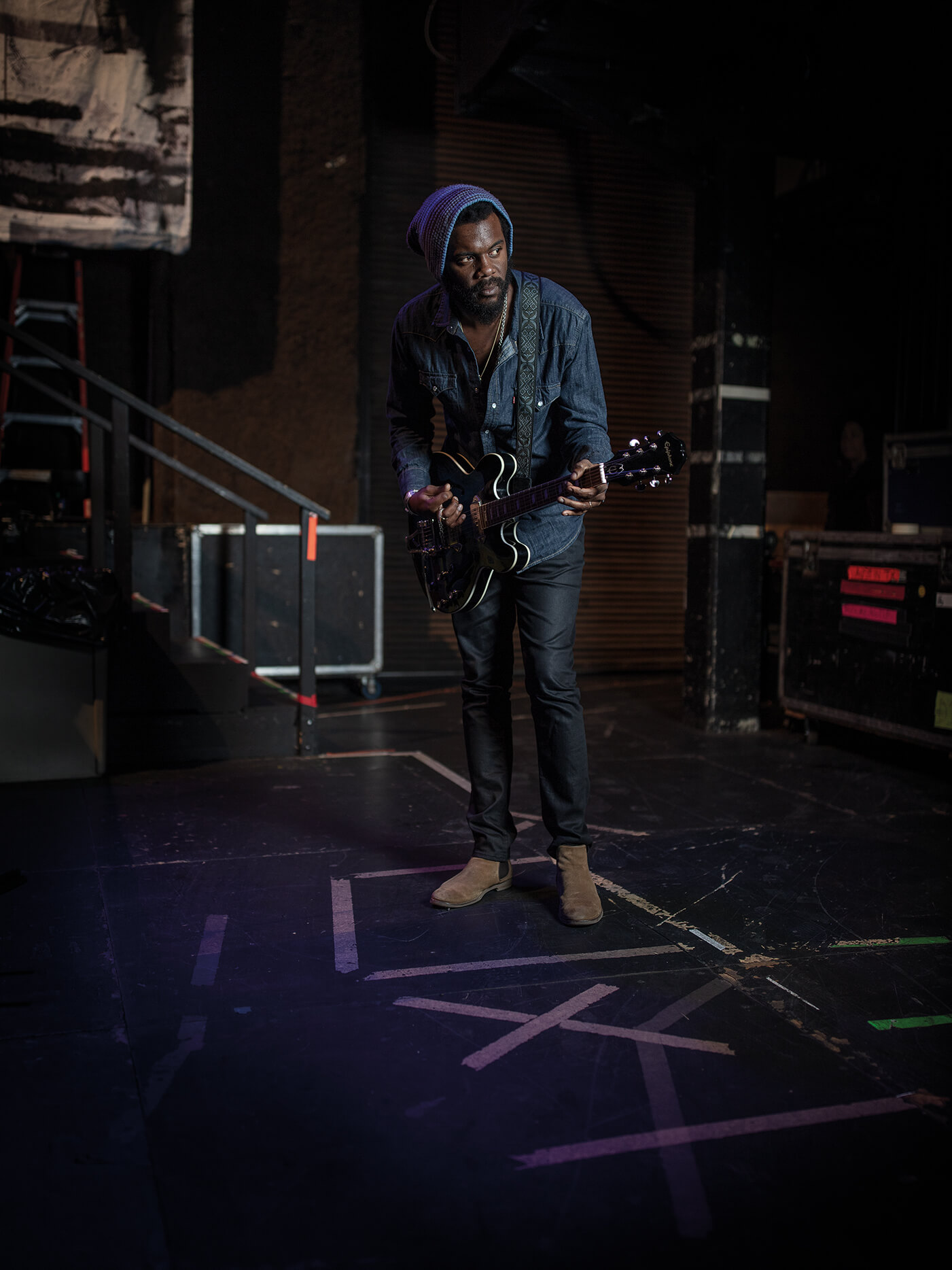
Clark earned his blues-guitar stripes in the clubs and bars of Austin’s famous blues scene, following in the legendary footsteps of the likes of Stevie Ray Vaughan, Jimmie Vaughan, Johnny Winter and many others. But while Clark has become the modern standard-bearer for Austin’s blues spawning ground, his family name has long been part of the city’s musical firmament, thanks to his cousin WC Clark, the ‘godfather of Austin blues’ and one-time bandmate of Stevie Ray Vaughan. Though surprisingly, Clark Jr wasn’t even aware the two were related until he was already far down his musical path.
“Yeah, yeah, I’m related to WC,” Clark confirms. “Unfortunately, we aren’t as close as you might think, given that we’re both in music. I remember I went with my dad to see him at a place called Momo in Austin, because I’d heard about what a good player he was and I knew all about his history in the Triple Threat Revue with Stevie Ray Vaughan and Lou Ann Barton. And so I thought, ‘Well, he’s called Clark too, I’ll check him out!’
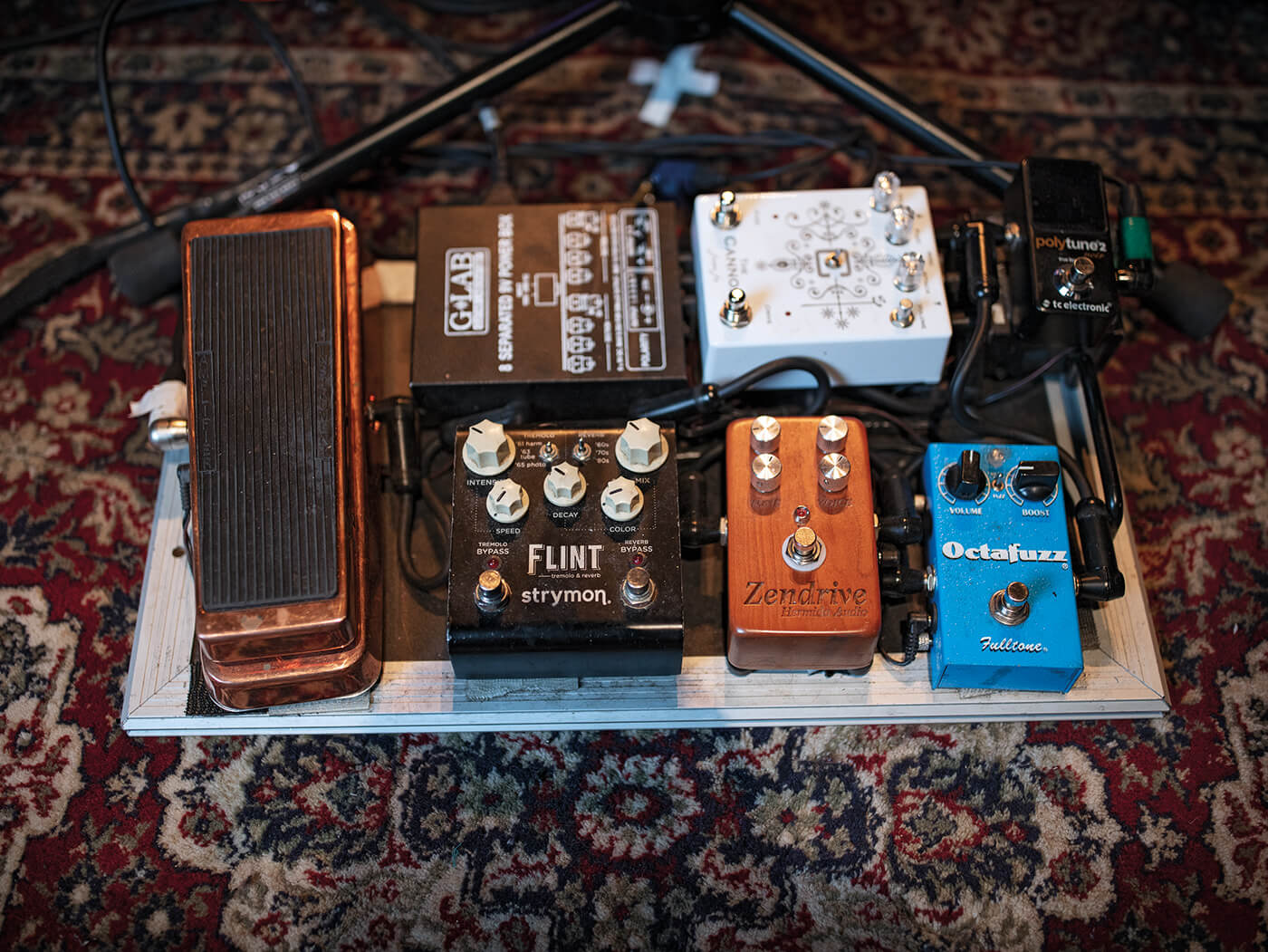
“So we went along and we got talking to him after the show, and we ended up talking about family, where we were from and all that stuff and a mutual relation came up. They used to call him ‘California’ and WC was like: ‘You know California?!’ and my dad’s like: ‘Yeah, that’s my dad!’ and it all went on from there. It’s funny how I found out, and I’m glad that I did. But it’s the nature of what we do, the fact that we’re both working means we don’t get much chance to catch up.”
The King and I
Clark’s immediate family might not have been musicians, but he still came from a musical home, and it wasn’t long before a young Gary became fascinated by the instrument that would come to define his life. “I’ve always been interested in the guitar, and my dad had a few of them in the house when I was growing up,” he recalls. “I actually dinged one of them when I was trying to sneak a go on it once. I’d snuck it away and tried to play it, but then when I came to try to put it back on the stand it just fell off and hit the floor and… crack!”
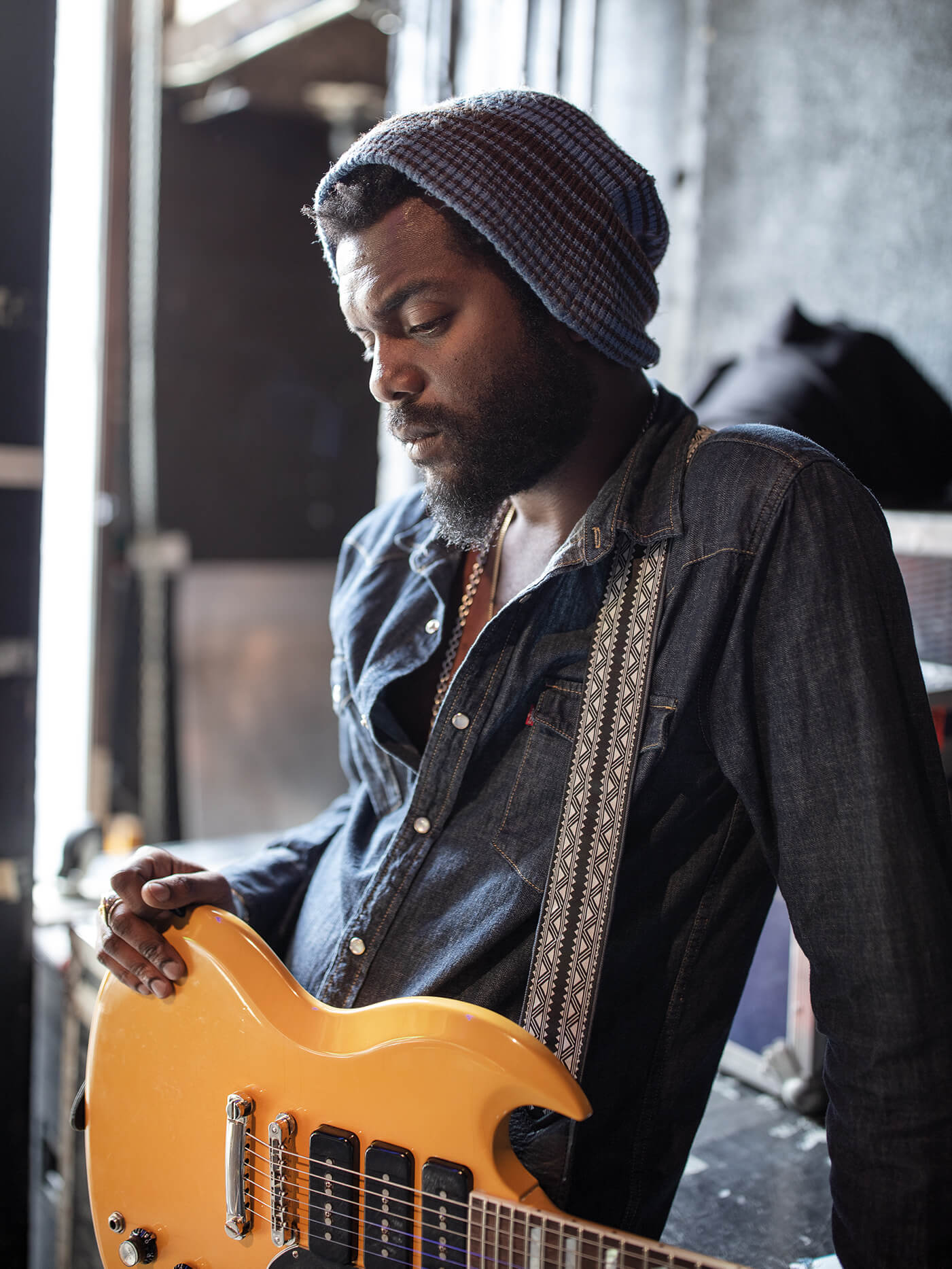
Despite being a child of the early-to-mid 90s, however, it wasn’t the visceral power of grunge or the experimentalism of indie-rock that first captivated Gary in his formative years…
“I remember watching videos of Michael Jackson live, when he had Jennifer Batten playing guitar for him – and she had this crazy guitar and lights in her hair and was doing all this killer guitar,” he enthuses. “But even before that, Tito Jackson… I was a huge Michael Jackson fan but also of The Jackson 5. I loved watching the old clips, and Tito there with this big red Gibson, playing off Jermaine… that’s pretty much the whole reason I wanted to play the guitar… it just took me a while to actually get my hands on one!”
Blazing a trail
Clark finally got his hands on a guitar legitimately at the age of 12, and soon after, found himself the proud owner of an electric of his very own, though it was perhaps not the perfect instrument for an aspiring bluesman… “The first guitar that was actually mine was an Ibanez RX20 – black, maple neck, couple of humbuckers, nothing crazy,” he explains. “I feel bad because I’ve got much respect for Ibanez, but a couple of years ago, someone asked me if it was a good guitar, and I said: ‘No! But it was a great guitar, because it was mine!’ Y’know, objectively, it wasn’t a quality instrument… it really wasn’t all that, but it opened up a whole new world to me and changed my life forever, so shout out to Ibanez, I meant no disrespect!”
Indeed, the young Clark was certainly taken by the Japanese brand at this early stage, but as a devotee of Hendrix and SRV, he needed something that was a little bit less ‘hair metal’…
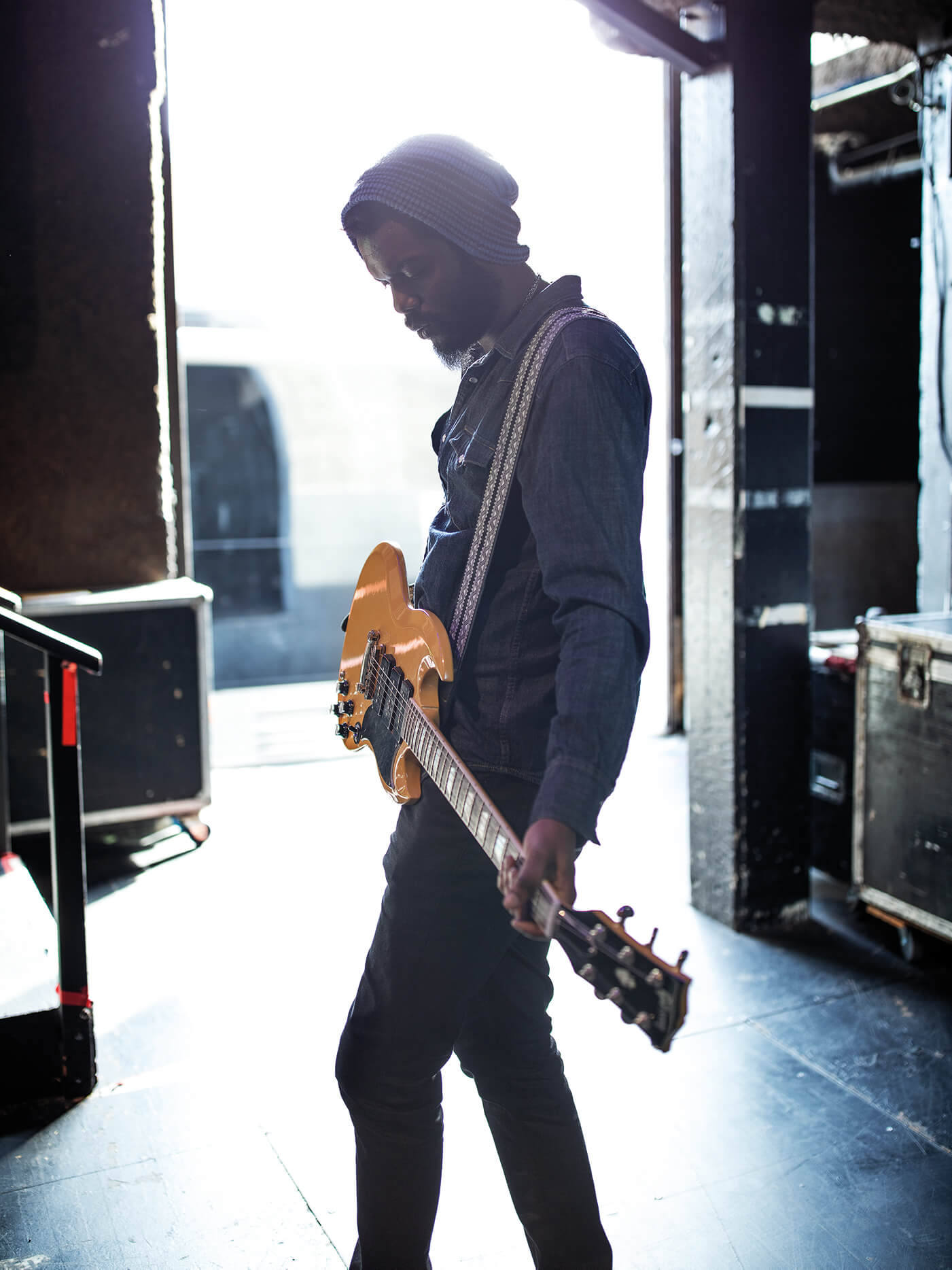
“For my first proper guitar, I stuck with Ibanez, and I got an Ibanez Blazer,” he recalls warmly. “That had the coil tap on it, so I could switch between the humbucker and a single coil, it was this beautiful sunburst, rosewood neck… I was into a lot of Stevie Ray Vaughan at the time and I couldn’t get one of those signature models, but this got me close enough, y’know? I could finally get those single-coil tones of a Hendrix or a Stevie or the early Buddy Guy, but then I could flip that switch and do that powerchord thing, play my rock ’n’ roll music! I’ve actually still got it – I got it from my parents’ house, dusted it off, and it still works for me.
“The gigs, the conversations, the people I’ve played it with on stage – Clapton, Jimmie Vaughan, Hubert Sumlin, Eric Johnson… all came from this guitar. It’s still got that old blues-club musk on it – it’s had beer spilled on it, smoke on it… it’s unique.”
Paying your dues
Speaking of Clapton, it’s nearly a decade now since the moment that took Clark from working the blues clubs in Austin relentlessly to a major-label record deal, headline shows in huge theatres and a Grammy Award – an explosive performance that lit up Eric Clapton’s 2010 Crossroads Guitar Festival in Chicago. Watching the performance on YouTube today, you can see exactly why his searing, fuzz-laden performance of Bright Lights convinced so many that they were witnessing the arrival of generational guitar talent… but in fact, before he’d been invited to play, Clark was starting to wonder for the first time whether he had to accept that it was time to get a regular job.
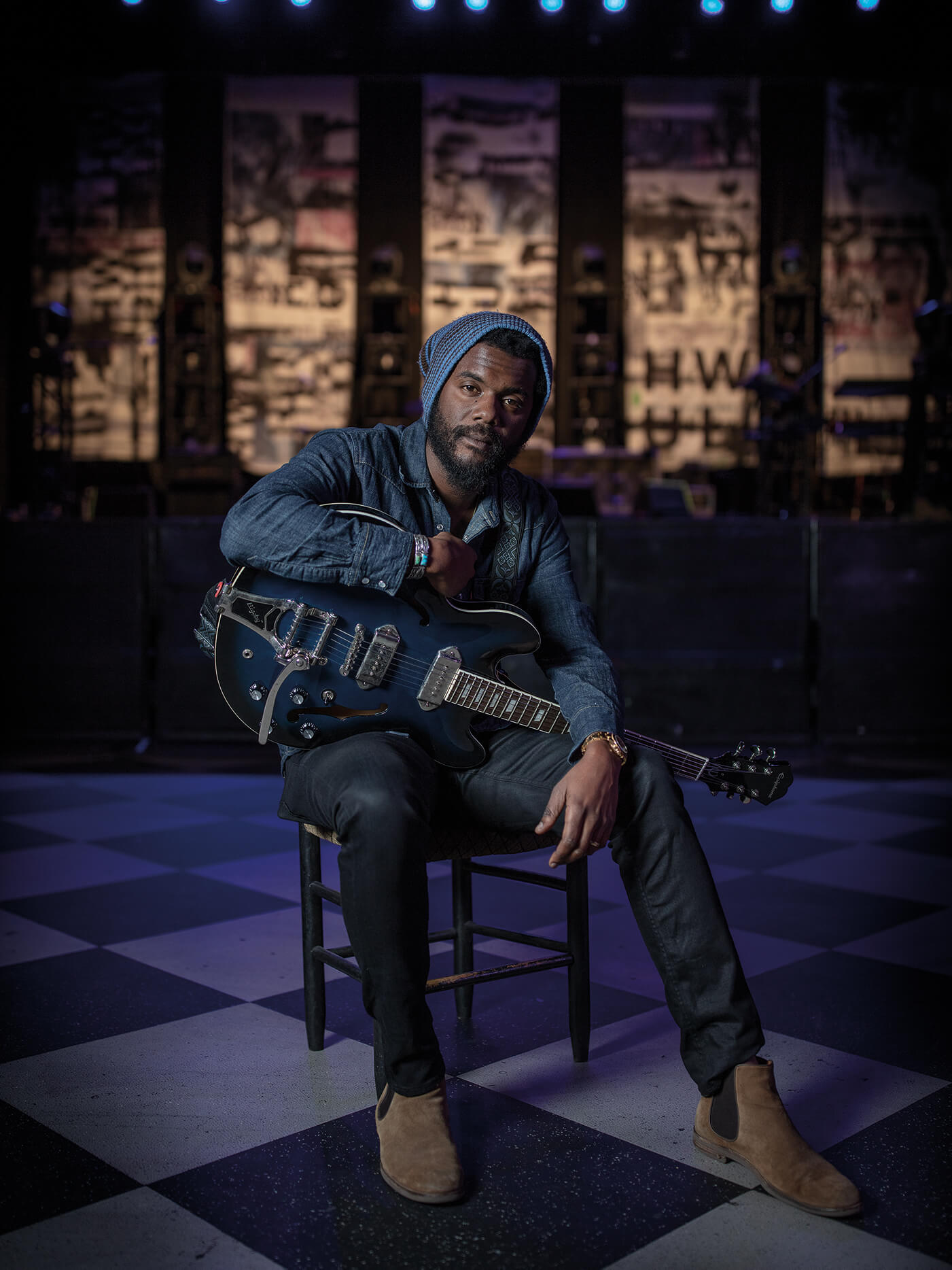
“Nobody could tell me that it wasn’t going to work, and I was doing okay at times. I was making a living, and I got some acting gigs here and there, which would give me a bit of money to tide me over,” he remembers. “But I didn’t want to get a job, because the time that I wasn’t on stage, I was trying to write songs, or learn to be a better drummer, or how to work drum machines, or be a DJ, how to work Pro Tools… because I just wanted to work in music so much. I was just living the textbook life of a struggling musician.
“There was this woman called Claire who let me live in this house and use it as a studio. And I was late paying my rent because I’d bought some gear, but God bless Claire, she’s a beautiful woman, and to this day, I owe her the world. So I’d bought a recorder to work on my hooks and stuff, try to be a bit more professional… and then as soon as I started working with it, my power got cut!
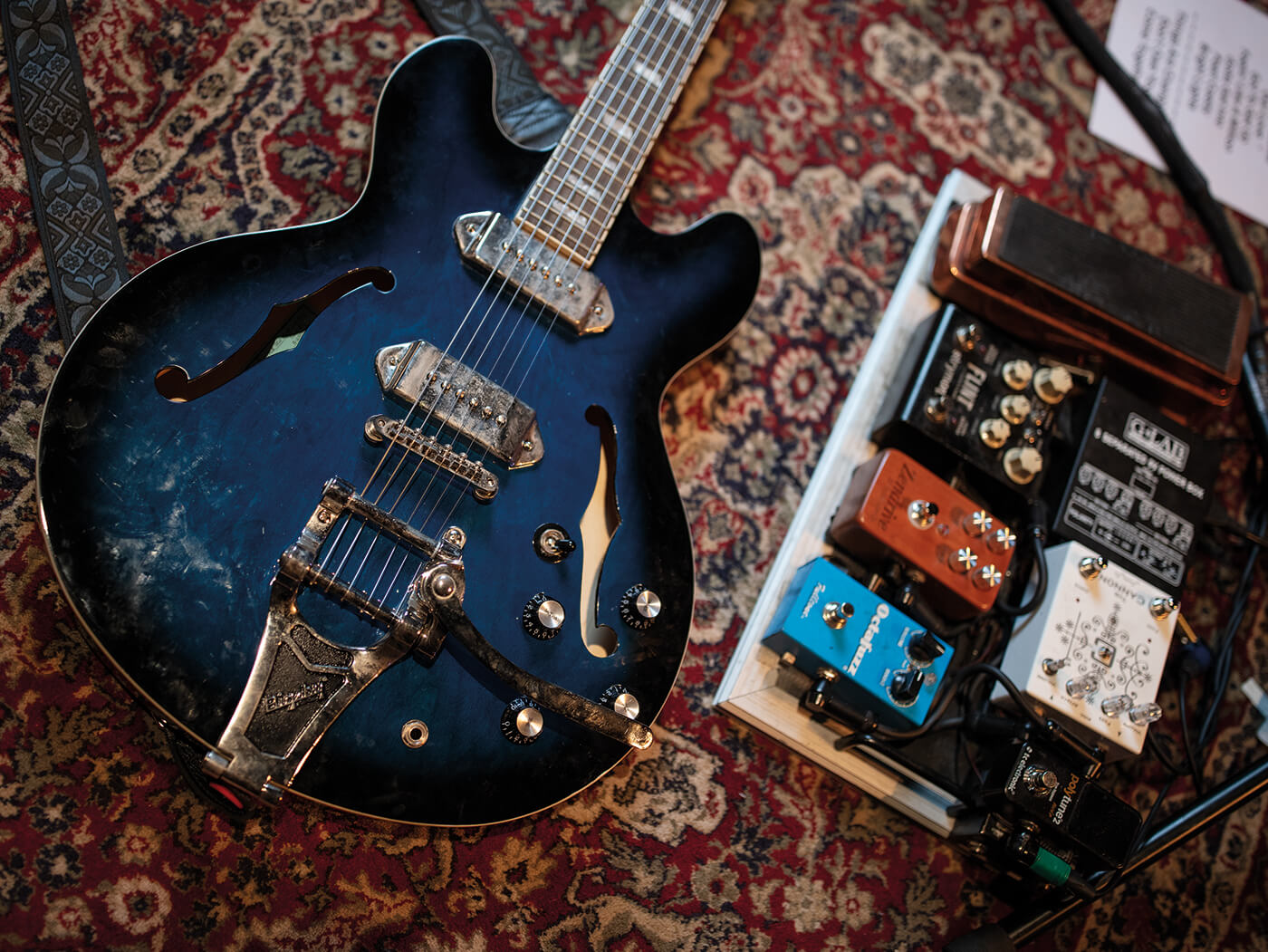
“But then the next day, Doyle Bramhall calls me up and says: ‘Hey, I think Clapton’s going to invite you to the Crossroads Festival.’ And it happened just like that! The night before I’d been sitting in the dark, all I had was candles, thinking, ‘I don’t know, maybe I’m going to have to do something else.’ Because I was getting older, y’know? It’s like, that was cute when you were younger, but now you’re 25 or 26, it’s time to figure it out. Maybe you’re done. And then the next thing I know, this letter arrives in the mail and it’s like, ‘Well I guess I’m not done!’”
Outstanding at The Crossroads
The Crossroads performance catapulted Clark to stardom. Soon, he would count the likes of Keith Richards, BB King and even Barack Obama as fans, and he made the jump from playing legendary Austin blues club Antone’s (which Clark now part-owns) to playing Coachella and joining Clapton on stage at the Royal Albert Hall.
Slowhand was so struck by the young guitarist’s performance that he famously wrote him a letter afterwards, saying: “Thank you – you make me want to play again.” Buddy Guy has said of Clark that: “He’s as good as it gets,” and the aforementioned 44th President hailed him as: “The future of music.”
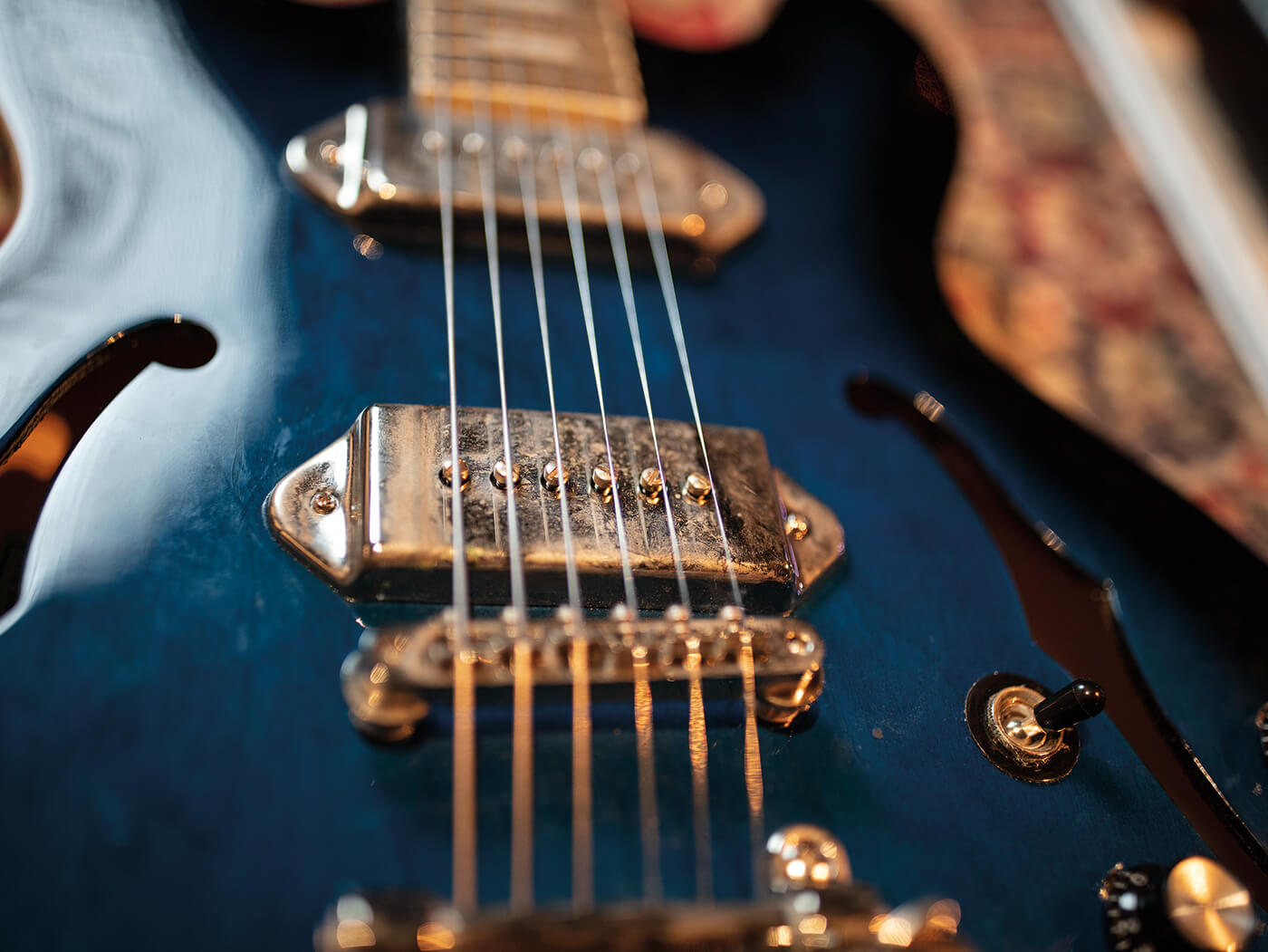
Being told all that before your first major-label album even comes out seems like a lot to put on a young guitar player, but Clark insists that he was always driven enough to not give it much thought. “I don’t really pay much attention to it,” he insists. “I understand what it is, but I don’t let it affect me. I don’t sit around here thinking about myself in those terms! [laughs] I put enough pressure on myself to be the best that I can be, and I also feel like I have a responsibility to my family to look after them and make sure they’re provided for.
“So I put pressure on myself just to make sure that they’re all okay and that I’m making the best music I can make, and that I hopefully can relate to as many people as I can. But when people talk about all that stuff, I don’t really follow along with the hype, y’know? It’s hard enough out here!”
Blues power
Perhaps because he’s always been determined to forge his own path and ignore what others expect him to do that Clark has never made a straight-up blues album – instead seeking to fuse roots music with rock, soul, R&B, hip-hop and more. With this in mind, we can’t help but wonder if he would find making a straight-ahead blues record a little dull by comparison.
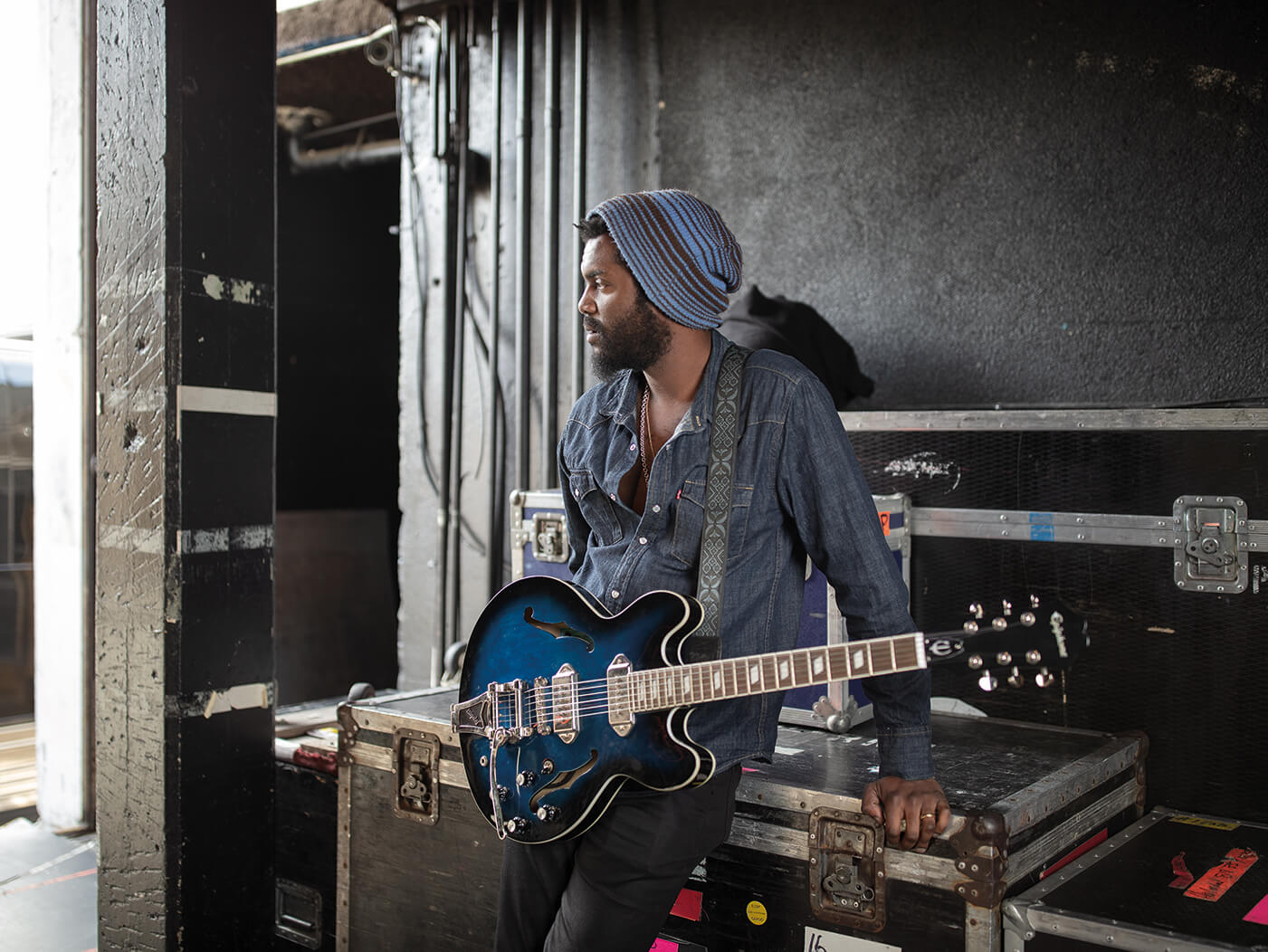
“It’s not boring to me,” he explains. “It’s just that I spent a lot of time as a young guy playing ‘traditional’ blues. That’s how you learn – mimicking the greats. But I was doing all this other stuff as well. I was messing around with turntables and learning to make beats, I was picking up trumpets, trying to figure out the saxophone, the piano… anything I could use to make music. I went through this box of stuff once and found some bagpipes. It was like, ‘why do I have bagpipes!?’ But anything that made noise, I wanted to mess with it! I was very experimental. And growing up in the 80s, 90s and 2000s, there was this whole world that I could access through the internet, so it’s not like I was just hearing blues. I was just doing my own thing.
“I think as I get older and you go through life’s twists and turns, I could sit back and write a super-legit blues album that’s original and vibey. But for the time being, there’s all this technology and different instruments and sounds that people are making and I just want to get up in that right now – that’s what keeps me interested and engaged.”
Land of plenty
All of which brings us to This Land, Clark’s third major-label release, and his first since 2015’s The Story Of Sonny Boy Slim. It’s a powerful, raw album that fuses together blues, soul, jazz, hip-hop and rock ’n’ roll as the vehicle for lyrics that paint an uncompromising picture of an American society that’s fractured and dissatisfied.
Roots music and cultural commentary have long gone hand in hand, but it’s still refreshing to hear an artist speak so frankly and emotionally about the world outside his door. Despite this, Clark insists that the political events of the last few years didn’t compel him to write songs such as the angry, frustrated call-to-arms of the album’s title track.
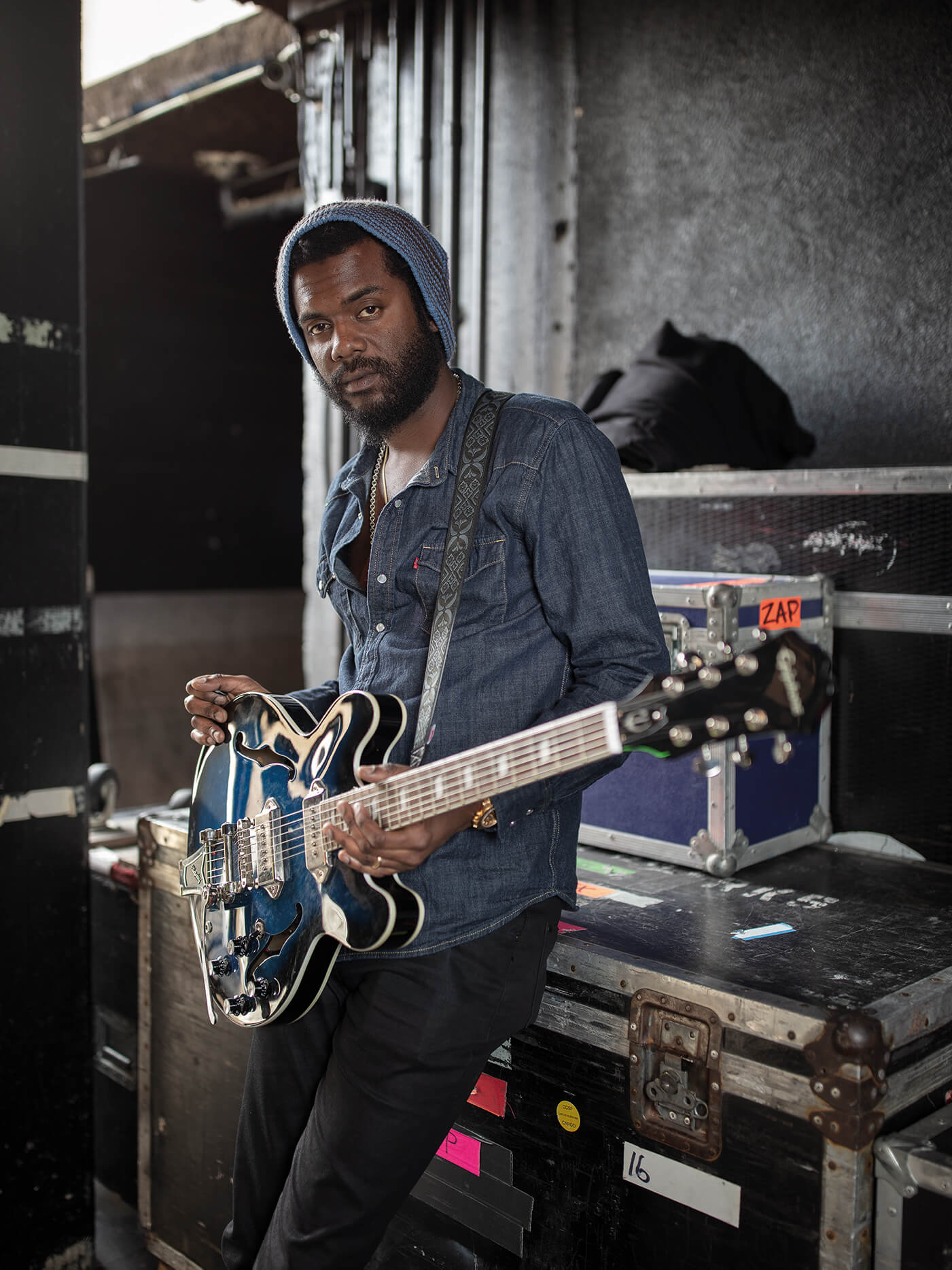
“I didn’t feel like I had to do it at all, it’s just that I was feeling that kind of way, and after the past year it’s hard not to,” he elaborates. “With what’s on the news and everything, it brought up a lot of those kinds of feelings and thoughts, it’s scary.
“It’s not necessarily about politics, it’s just about being a human being. So yeah, I’ve made a record that’s referencing Trump, but that’s just because I was making it around the election and everything, and those were the sounds I was hearing where I was. It’s not a political statement, it’s more like, ‘yeah, I’m a human being, this is where I am, I have a life like everyone else.’ We’re all of us just trying to make the best life that we can, but we need to all be given the same chance, and the same opportunities, so that we can work hard and make something together, and then maybe we’ll be all good.”
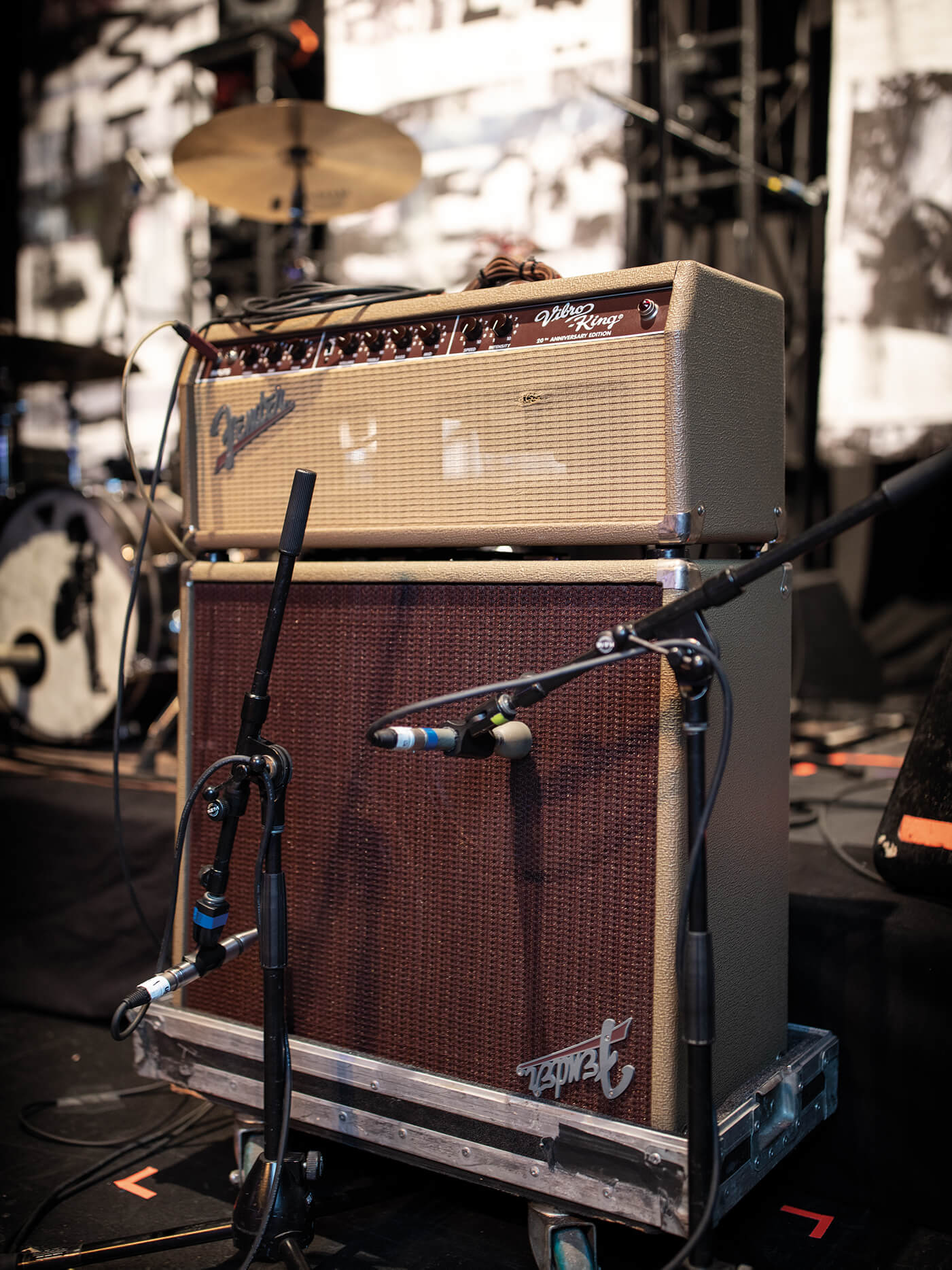
There’s always been an edge to Clark’s sound both live and in the studio, but This Land feels even more raw. We can’t help but wonder if the subject matter played a part on giving songs like the Fulltone Octafuzz-laden Pearl Cadillac such jagged energy, but it turns out the reality is a lot more mechanical… “I think that had a little bit to do with the fact that I actually made a good chunk of the record with a broken hand,” he explains. “That meant that when the time came, I had to really play. Instead of just play or sing the notes like I had on other records, I wanted to feel it. I wanted it to translate. I was really adamant with [producer] Jacob Sciba, whereas usually I’m really laid back and: ‘Well, you know this better than me!’ but this time I was like: ‘No, I want to feel this like I feel it when I’m playing it. I don’t want there to be anything lost in translation.’ And his response was: ‘Well you’d better sing your ass off, and play your ass off!’”
Casino jackpot
When it comes to his choice of instruments, Clark has become almost synonymous with the Epiphone Casino, even getting a signature ‘Blak & Blu’ model from the company in 2015, but his relationship with the instrument came around by happenstance.
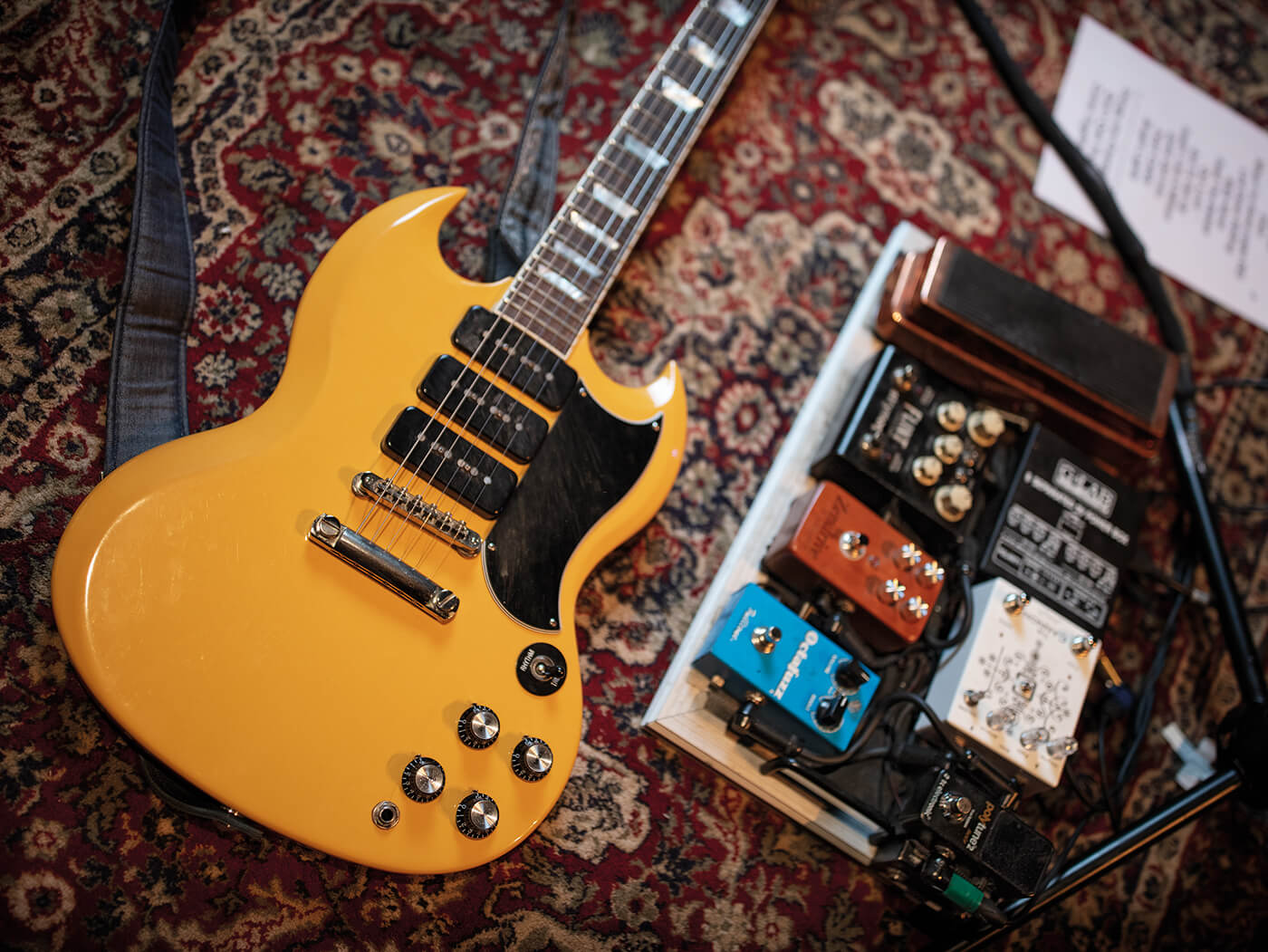
“I was playing Strats for a while, maybe from 2000 until 2008 or 2009? But everyone around Austin was playing Strats!” he laughs. “Everyone was playing a Strat with like, a Twin or a Super Reverb, and I was just done with it. Then I thought back to Tito Jackson and that beautiful red Gibson… and so I went up to this shop called Musicmakers in Austin and they had this beautiful Cherry red Casino in there. So I plugged it into a Princeton, said: ‘Yup!’, took it home with me, and that was it.”
For This Land, however, he’s abandoned his longtime hollowbody sidekick in favour of a P-90-loaded Gibson SG that became the primary voice of This Land. “I never thought that I would play an SG at all,” Clark exclaims. “But Pat Smear from the Foo Fighters, he was using one when we played on a record together, called Sonic Highways. He ended up giving me the guitar and I just fell in love with it. It’s so light, and it has a nasty edge that I’d never experienced before, so I got into ’em!
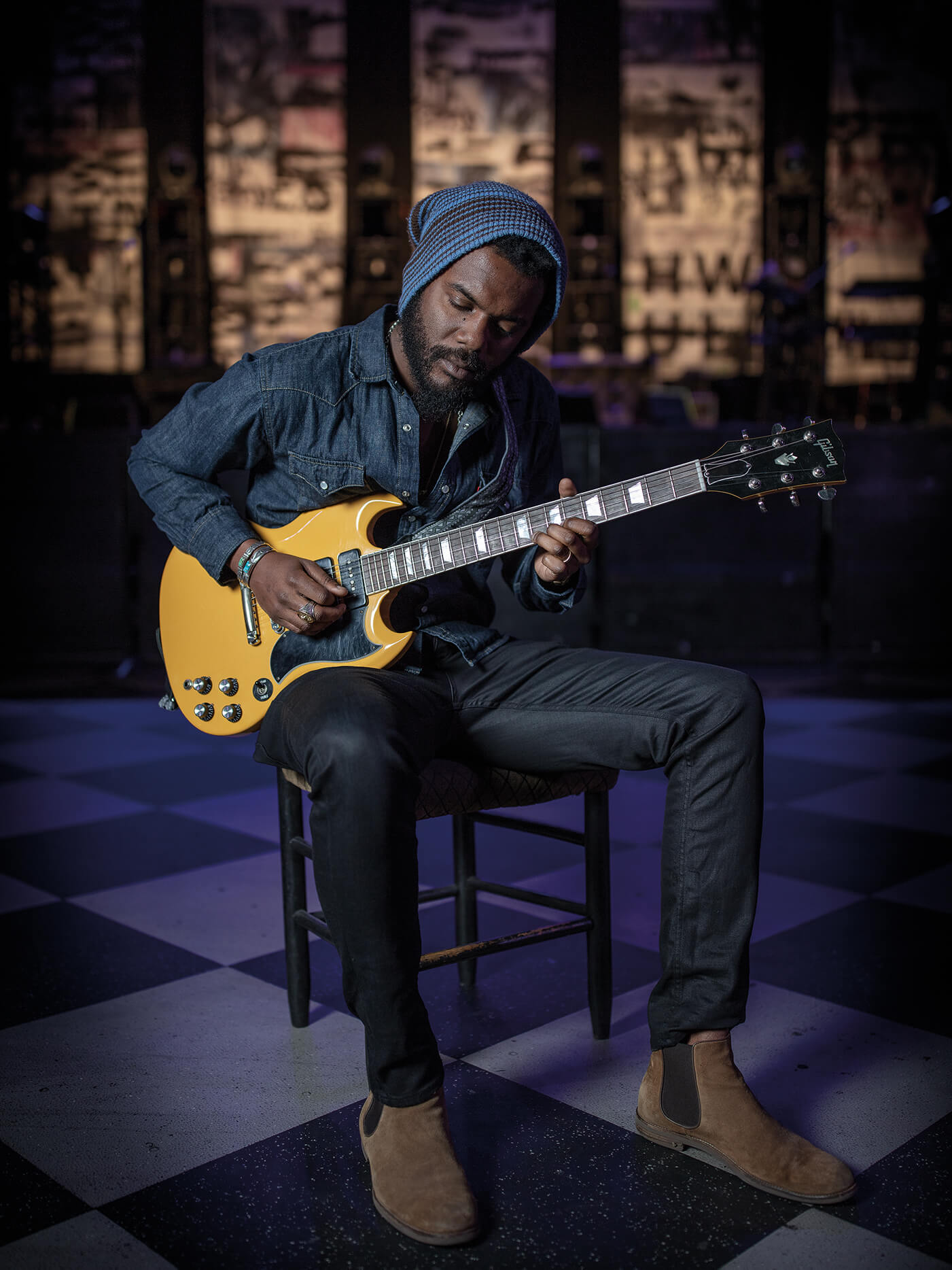
“And then one day, my guitar tech Dave called me and said: ‘I wonder what it would be like if we put three P-90s in an SG?’ So we shot it over to Gibson, and they said: ‘Well, we’ve never done that before…’ but it turned out even better than we thought.
“With my Casino, I was having a lot of issues with feedback. Feedback and fuzz pedals is cool sometimes… but a lot of times, it’d be out of my control and it would become somewhat problematic, considering the volumes we’re working at. They were like: ‘Well, you could sacrifice the volume…’ Nahhhhhh [laughs]. So here we are with the SG!”
Gary Clark Jr’s This Land is out 1 March 2019 on Warner Music. Instagram, Twitter and Facebook: @garyclarkjr
